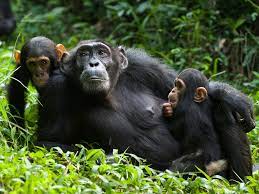KIKUUBE – Conservationists in Uganda say over 1,000 chimpanzees have been killed in the country in the last 12 years.
According to Dr. Joshua Rukundo, the executive director of Chimpanzee Sanctuary and Wildlife Conservation Trust [CSWCT], the population of chimpanzees in Uganda has remained static numbering about 60,000 for the last 12 years, despite efforts to conserve them.
“Chimpanzees are always killed but we do not have exact numbers. some cases get reported when there are conflicts with humans. We only get reports of incidences where chimpanzees have been killed and their body parties have been taken. We do not get to know about many of those that get killed in the forests. We also estimate that for every chimpanzee that we rescue, at least six adults have been killed.”
He attributed such killings to man’s continued destruction of forests which are the habitats of the primates said to have 98.7 percent of man’s genetic blueprint. He called for a concerted effort to save the primates in the country.
He made the remarks on Friday at Kaseta Primary School in Kabwoya Sub-county during the launch of a tree planting campaign aimed at promoting conservation and restoration of the depleted Bugoma Forest Reserve in Kikuube district. The forest reserve is home to some chimpanzees.
Dr. Rukundo said they target to plant over 100,000 trees, starting with 40,000 this year of which 5000 have been planted.
He noted that the tree planting campaign is part of the activities to mark 25 years of chimpanzee welfare, conservation, education, and awareness in the country.
He noted that under the campaign dubbed “Plant a tree, restore chimpanzee habitat” they will only plant indigenous tree species in schools and along the riverline area shared with Bugoma Forest Reserve.
He noted that chimpanzees are getting extinct due to the continued destruction of their habitats, adding that because of the destruction of the habitats, several chimpanzees have been isolated from their communities.
He added they target to establish corridors to protect the remaining patches of forests like Wambabya, Bugoma, and Budongo. This, he said, will give chimpanzees freedom of movement within the forests.
“Those corridors have been destroyed and it’s imperative that we restore them for the future prosperity of the pieces of the chimpanzee,” he said.
Francis Twesige Mukoto the chairman LC3 for Kabwoya sub-county said the tree-planting campaign will reduce the conflict between humans and chimpanzees over resources like food.
Abdul Barebaki, a resident of Nyairongo village In Kaseta parish Kabwoya Sub-county, said the planting of trees has come at the right time when Bugoma Forest Reserve is facing extinction. He noted the depletion of the forest reserve has forced wildlife like chimpanzees to invade communities, loss of rain formation, and wood fuel resources.
He was optimistic that planting trees will restore the depleted environment and reduce wildlife attacks on their gardens.
Habitat and diet
According to scientists, chimpanzees have the widest range of any great ape. Though many populations live in tropical rainforests, they can also be found in woodlands and grasslands spanning from central to western Africa. They usually sleep in trees—typically the sturdy Ugandan ironwood tree, which offers the most firm and stable place to sleep—and build themselves nests of leaves.
Chimps also do most of their eating in trees. Though they generally prefer fruits and plants, they have a varied diet that also includes insects, eggs, nuts, and hundreds of other things. They relish meat, and have been known to kill and eat monkeys, small antelope, and even tortoises, which they slam against trees to break open their shells.
Reproduction
Females chimpanzees can give birth at any time of year, typically to a single infant that clings to its mother’s fur and later rides on her back until the time of weaning between ages three and five. Females reach reproductive age at 13, while males are not considered adults until they are 15.
Threats to survival
The International Union for the Conservation of Nature has declared the chimpanzee an endangered species—and the booming human population is primarily to blame. As humans move into more and more of the chimp’s geographic range, they clear away the ape’s forest habitat to make way for agriculture. Logging, mining, oil extraction, and new road and highway projects threaten to further degrade and fragment the chimp’s habitat.
In western Uganda, habitat loss has fueled conflict between humans and our closest relatives. Deforestation not only makes it harder for chimps to find a place to live, but it also strains their wild food supply. In desperation, many resort to foraging from the homes of humans nearby. Though they mostly steal fruit and other food within reach, the apes occasionally snatch and kill small children. Humans kill chimps in retaliation and to protect their families from future attacks.
Bushmeat hunters target chimps because they provide more meat than smaller mammals, sometimes collecting their offspring as pets for themselves or to sell into the illegal pet trade. And chimpanzees are susceptible to infectious diseases, too. Since the 1980s, the Ebola virus has killed them in significant numbers.
Conservation
Chimpanzees are protected by national and international laws, including the U.S. Endangered Species Act. Some of their habitat is protected as sanctuaries or reserves, too. Conservation organizations are working to expand these protected areas, while also pushing for an end to the illegal killing and taking of the animals.
Conservationists say key to securing the future of the chimpanzee, though, is improving its relationship with humans. Many organizations work with communities to build awareness about the threats chimpanzees face, develop action plans to preserve their habitats, and help community members develop alternative livelihoods that do not jeopardise the animal’s habitat.
https://thecooperator.news/killing-of-chimpanzees-for-meat-upsets-conservationists-in-bunyoro/
Buy your copy of thecooperator magazine from one of our country-wide vending points or an e-copy on emag.thecooperator.news
